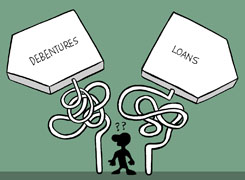Should I Sell My Flat to Clear Home Loan Debt?
Ramalingam Kalirajan |10881 Answers |Ask -Follow
Mutual Funds, Financial Planning Expert - Answered on Nov 18, 2024
He has an MBA in finance from the University of Madras and is a certified financial planner.
He is the director and chief financial planner at Holistic Investment, a Chennai-based firm that offers financial planning and wealth management advice.... more

Hi, I am having Outstanding Home loan amount for my first purchased flat as 9 Lacs.(EMI 21500) Recently I constructed bungalow by taking Home loan for land and constructions as 25 Lacs and 45 Lacs respectively (EMI 23000 and 32000). Thus my current outstanding for both the properties is 79 Lacs. I rented my first flat and living in new constructed bungalow. The rent amount is equal to flat EMI. Is it advisable to sell the flat (Selling price 50 Lacs) to clear the debt and continue the Outstanding loan of 29 Lacs (79Lacs - 50 Lacs) ? Or continue the existing loans and clear the debt early by prepayment's?
Here’s a breakdown to help you decide:
Option 1: Sell the Flat and Reduce Debt
Advantages:
Lower Debt Burden: Reduces loans to Rs 29 lakh, significantly decreasing EMI obligations.
Better Cash Flow: Frees up monthly cash for other financial goals or investments.
Reduced Interest Cost: Paying off Rs 50 lakh immediately lowers overall interest payments, saving a substantial amount.
Disadvantages:
Loss of Asset Growth Potential: Real estate prices may appreciate over the years. Selling might mean losing future capital appreciation.
No Rental Income: Selling eliminates the passive income that currently covers your flat’s EMI.
Option 2: Retain Both Properties and Focus on Prepayments
Advantages:
Asset Appreciation: You retain ownership of both properties, benefiting from potential price appreciation over time.
Rental Income: Ongoing rental income can contribute to paying off the flat’s EMI, keeping cash flow stable.
Disadvantages:
High Debt Pressure: Managing a Rs 79 lakh loan requires disciplined budgeting and significant prepayments to reduce interest costs.
Interest Accumulation: Continuing with high debt over the long term increases total interest paid.
Recommended Approach
Selling the Flat May Be Better If:
You prioritise reducing stress from high debt.
You don’t foresee substantial appreciation in the flat’s value.
Clearing a large portion of your debt aligns with your financial comfort.
Retaining the Flat May Be Better If:
You can afford current EMIs and have surplus funds for regular prepayments.
The flat is in a location with strong appreciation potential.
Passive rental income is a key component of your financial plan.
Practical Advice
Evaluate Loan Interest Rates: Check the interest rates for both loans. Prioritise prepaying the one with the highest rate.
Review Budget: Assess whether prepayments are feasible without compromising financial security.
Consider Property Market Trends: Evaluate the appreciation potential of your flat before deciding to sell.
Seek Professional Guidance: A Certified Financial Planner can assess your risk tolerance, long-term goals, and cash flow needs to offer tailored advice.
Best Regards,
K. Ramalingam, MBA, CFP,
Chief Financial Planner,
www.holisticinvestment.in
https://www.youtube.com/@HolisticInvestment
Best Regards,
K. Ramalingam, MBA, CFP,
Chief Financial Planner,
www.holisticinvestment.in
https://www.youtube.com/@HolisticInvestment
You may like to see similar questions and answers below
Ramalingam Kalirajan |10881 Answers |Ask -Follow
Mutual Funds, Financial Planning Expert - Answered on May 12, 2024
Milind Vadjikar | Answer |Ask -Follow
Insurance, Stocks, MF, PF Expert - Answered on Sep 09, 2024
Ramalingam Kalirajan |10881 Answers |Ask -Follow
Mutual Funds, Financial Planning Expert - Answered on Nov 20, 2024
Ramalingam Kalirajan |10881 Answers |Ask -Follow
Mutual Funds, Financial Planning Expert - Answered on May 15, 2025
Ramalingam Kalirajan |10881 Answers |Ask -Follow
Mutual Funds, Financial Planning Expert - Answered on May 15, 2025
Dr Dipankar Dutta |1841 Answers |Ask -Follow
Tech Careers and Skill Development Expert - Answered on Dec 14, 2025
Nayagam P P |10854 Answers |Ask -Follow
Career Counsellor - Answered on Dec 14, 2025
Radheshyam Zanwar |6744 Answers |Ask -Follow
MHT-CET, IIT-JEE, NEET-UG Expert - Answered on Dec 14, 2025
Radheshyam Zanwar |6744 Answers |Ask -Follow
MHT-CET, IIT-JEE, NEET-UG Expert - Answered on Dec 14, 2025
Dr Dipankar Dutta |1841 Answers |Ask -Follow
Tech Careers and Skill Development Expert - Answered on Dec 14, 2025
Dr Dipankar Dutta |1841 Answers |Ask -Follow
Tech Careers and Skill Development Expert - Answered on Dec 13, 2025
Dr Dipankar Dutta |1841 Answers |Ask -Follow
Tech Careers and Skill Development Expert - Answered on Dec 13, 2025
Mayank Chandel |2575 Answers |Ask -Follow
IIT-JEE, NEET-UG, SAT, CLAT, CA, CS Exam Expert - Answered on Dec 13, 2025
Radheshyam Zanwar |6744 Answers |Ask -Follow
MHT-CET, IIT-JEE, NEET-UG Expert - Answered on Dec 13, 2025
Mayank Chandel |2575 Answers |Ask -Follow
IIT-JEE, NEET-UG, SAT, CLAT, CA, CS Exam Expert - Answered on Dec 13, 2025























